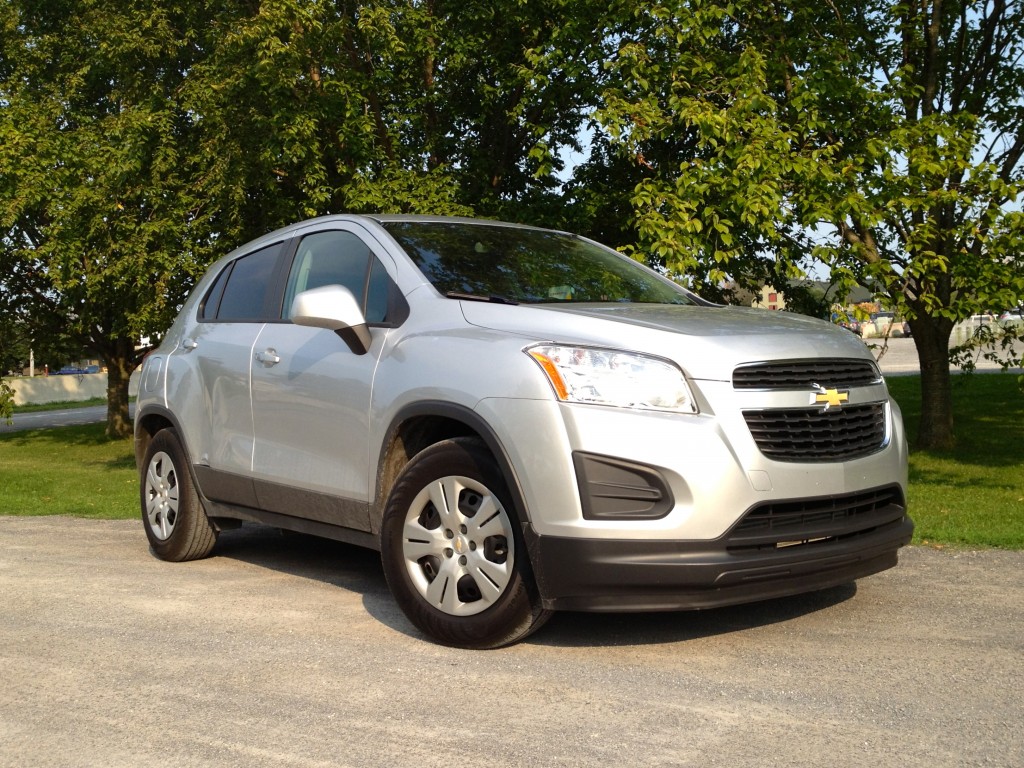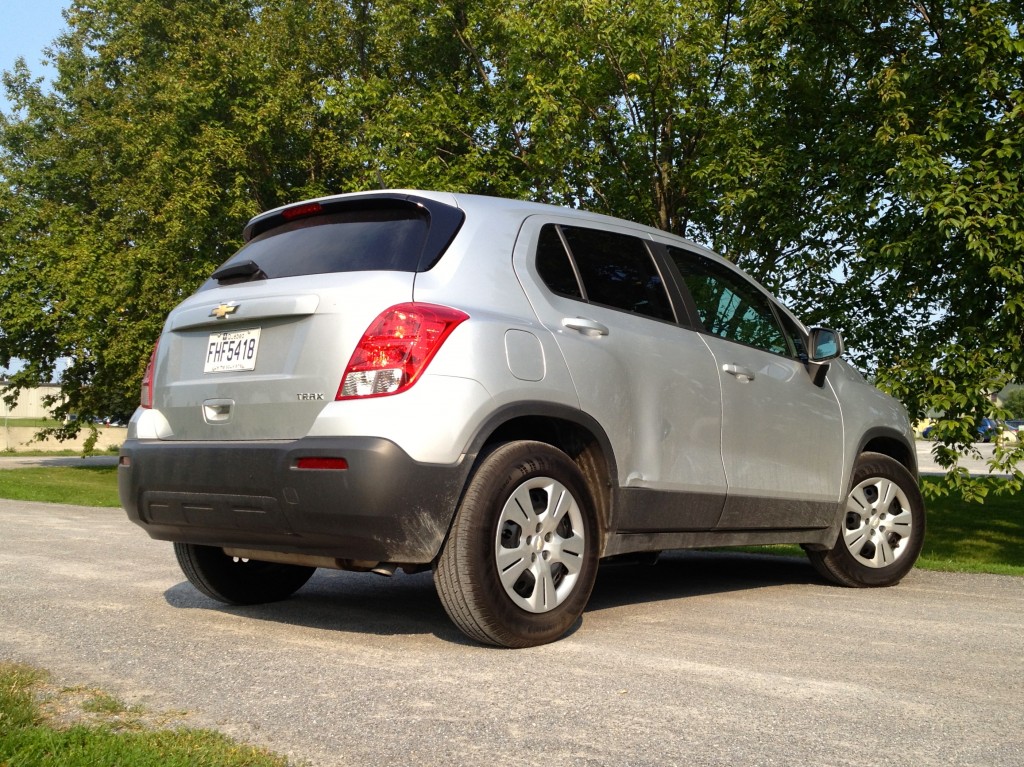Road Test: 2013 Chevrolet Trax LS
Story and photos by John LeBlanc
Perhaps it was the ability to slain the biggest woolly mammoth, pick far-to-reach fruit, or make a basket at the buzzer. Somewhere along the way in history, being tall became desirable. And the same now goes for small cars.
Where subcompact car buyers once only found regular-height vehicles, an influx of taller small crossovers — the equivalent of shoe lifts — has invaded the bottom-rung classes. And one of the most recent examples is the new-for-2013 Chevrolet Trax.
Like Chevy’s Orlando, the Trax is exclusive to the Canadian market in North America and is essentially a longer/wider/taller version of Chevy’s four-door, five-passenger subcompact Sonic hatchback.
And just as the pay scale for professional basketball players seems linked to their height, Chevy charges more for the Trax than its shorter Sonic hatchback sibling. My tester was a base, front-wheel-drive Trax LS. With optional air conditioning and a six-speed automatic transmission (that replaced a manual gearbox with the same number of gears), it’s priced at $22,745 (all prices include a $1,550 freight and pre-delivery inspection fee).
While that’s a healthy $3,640 more than a similarly equipped Sonic LS, the Trax makes up for some of that price difference by offering the Sonic’s optional 1.4-litre turbocharged four-cylinder gas engine as standard. It comes with the same 138-horsepower rating as the non-blown 1.8L four found in the Sonic LS, but with 148 pound-feet of torque, a much-needed 23 more lb.-ft.
I say “much-needed” because adding together “turbo” and “Trax” does not equal “performance.” Mainly due to the small Chevy crossover’s extra weight (163 kilograms more than the 1,220 kg Sonic hatchback), the added oomph under its hood doesn’t translate into quicker straight-line times. Both the Trax and Sonic ring in at an underwhelming 9.5 seconds from zero to 100 km/h. Of course, for similar money, the $22,795 Sonic LTZ (that gets the Trax’s turbocharged four) shaves about one second off that time, and gets better fuel economy too: 7.7 L/100 km in the city, 5.5 on the highway, compared to 8.1 and 5.9, respectively, for the crossover.
Perhaps a Trax with the manual transmission would give a better impression of swiftness, as the Chevy’s autobox saps what little power is coming from the wee, blown four-banger. I suspect to score those okay fuel ratings, the transmission has been tuned to hold off on downshifting for an agonizingly long time. Tromp on the Trax’s throttle and the wait for some kind of forward motion will remind you of what is was like wishing for Christmas to come as a kid. Like a lot of Chevrolets, there’s a small, hard-to-use rocker switch on the left side of the gear selector to change gears manually.
The Trax’s extra height does give you more headroom than its hatchback brother, and a higher seating position so drivers don’t feel overwhelmed by other tall vehicles on the roads. And in addition to the 60/40 split rear seats, the small crossover’s front passenger seat can be folded to allow long objects to be hauled. But the Trax’s 41 millimetres of extra width doesn’t make its rear seat any more hospitable for three-across seating than in the Sonic. And not only does the crossover’s wider C-pillar make rear visibility problematic, its 530 litres of cargo room behind its rear seats is nine litres less than the hatch.
For a crossover, the Trax is a nimble machine that seems at home nipping in and out of urban traffic. As a platform-mate to the Opel Mokka, the Chevy has adopted a few European road manners. The Trax’s electric steering has a lot of weight, and is both quick and linear in its reactions. While its ride and handling setup is a nice balance that provides comfort over bad pavement and little body roll in corners. That said, the Sonic LTZ is one of the better driving small hatches you can buy, and its lower centre of gravity makes it a much more tossable vehicle than its taller and heavier crossover sibling.
While I didn’t set out to make this a crossover-versus-hatchback comparison test, I’m finding it hard to justify the premium pricing the Trax demands over the Sonic. And let’s not leave out a host of more comfortable and roomier compact hatchbacks — like the Ford Focus, Mazda3 and Volkswagen Golf — that can be had for similar dough.
Sure, traction fans will argue that you can’t get all-wheel-drive with a Sonic. That’s true. But know that an AWD Trax (with a mandatory automatic transmission) will cost you $26,705. So other than more headroom and a taller ride height, the Trax is still the poorer buy out of the two small Chevys. But what do I know? Apparently these small crossovers are all the rage these days. Even if they are the equivalent of shoe lifts.
Road Test: 2013 Chevrolet Trax LS
Type of vehicle Front-wheel-drive, subcompact crossover
Engine 1.4L DOHC turbocharged four-cylinder gas engine
Power 138 hp @ 4,900 rpm, 148 lb-ft @ 1,850 rpm
Transmission Six-speed automatic
Brakes Front-disc/rear-drum with ABS
Tires P205/70R16
Price: base $18,495
Destination charge $1,550
Natural Resources Canada fuel economy L/100 km 12.1 city, 7.2 highway, 9.8 as-tested
Standard features 10 air bags, electronic stability enhancement system, six months of OnStar Directions and Connections service, electronic stability control system, six-speed manual transmission, halogen, daytime running lights with automatic light control, power remote control mirrors, with shift indicator, rear-window intermittent wiper, two-piece storage tray under cargo load floor, electric rear window defogger, remote keyless entry system with panic feature, tilt adjustable and telescopic steering column, three-spoke steering wheel with Bluetooth and audio system controls, USB port











![[del.icio.us]](https://www.straight-six.com/wp-content/plugins/bookmarkify/delicious.png)
![[Digg]](https://www.straight-six.com/wp-content/plugins/bookmarkify/digg.png)
![[Facebook]](https://www.straight-six.com/wp-content/plugins/bookmarkify/facebook.png)
![[Google]](https://www.straight-six.com/wp-content/plugins/bookmarkify/google.png)
![[Reddit]](https://www.straight-six.com/wp-content/plugins/bookmarkify/reddit.png)
![[StumbleUpon]](https://www.straight-six.com/wp-content/plugins/bookmarkify/stumbleupon.png)
![[Twitter]](https://www.straight-six.com/wp-content/plugins/bookmarkify/twitter.png)
![[Email]](https://www.straight-six.com/wp-content/plugins/bookmarkify/email.png)